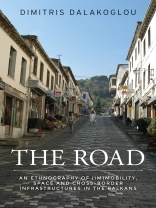This book is an ethnographic and historical study of the main Albania-Greece highway. But more than an ethnography on the road, it is an anthropology of the road. Highways are part of an explicit cultural-material nexus that includes houses, urban architecture and vehicles. Complex socio-political phenomena such as EU border security, nationalist politics, post-Cold War capitalism and financial crises all leave their mark in the concrete. This book explores anew classical anthropological and sociological categories of analysis in direct reference to infrastructure, providing unique insights into the political and cultural processes that took place across Europe after the Cold War. More specifically, it sheds light on political and economic relationships in the Balkans during the socialist post-Cold War period, focusing especially on Albania, one of the most under-researched countries in the region.
Содержание
1. From dromocracy towards a new critical dromology
2. The road to Albania
3. The state(s) of the road
4. The city and the road
5. Fear of the road and the accident of postsocialism
6. The road on/of transition
7. Domesticating the road
8. Infrastructures, borders, (im)mobility, or the material and social construction of new Europe
References
Index
Об авторе
Dimitris Dalakoglou is Professor at Vrije University Amsterdam, where he holds the Chair in Social Anthropology












